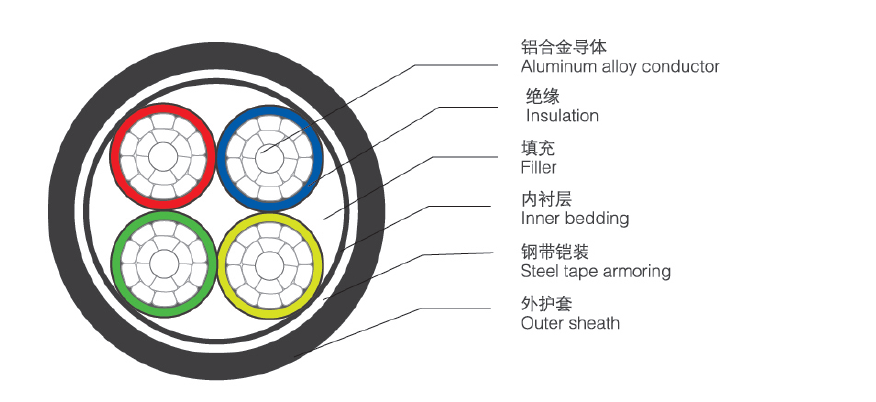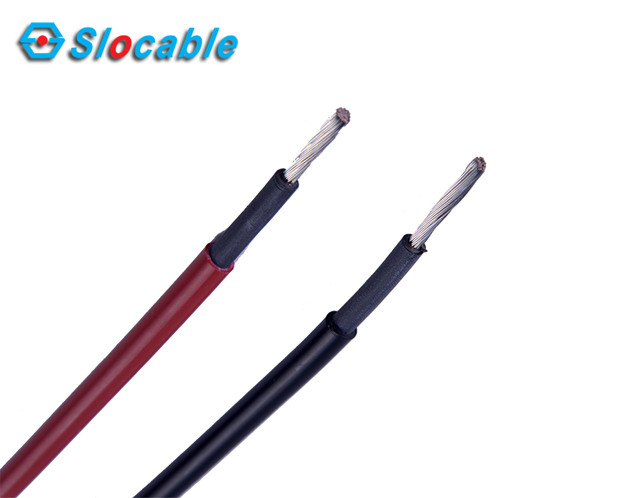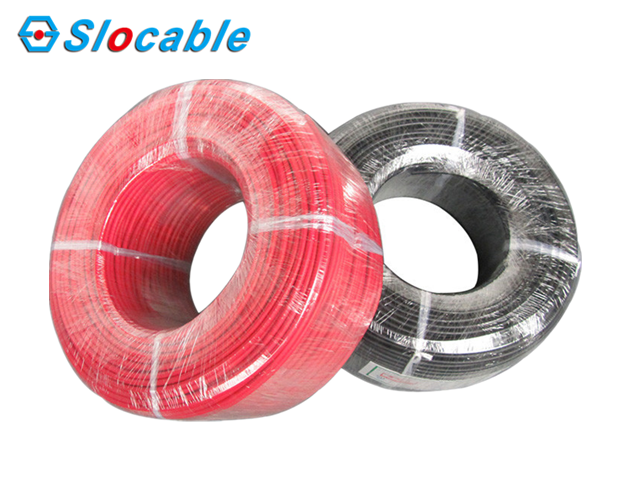In photovoltaic projects, the choice of copper core cable or aluminum core cable is a long-standing problem. Let’s take a look at their differences and advantages.

The difference between copper core and aluminum core
1. The colors of the two cores are different.
2. The aluminum pv wire is lighter in weight, but the mechanical strength of the aluminum wire is poor.
3. Under the same power load, because the current carrying capacity of aluminum is much smaller than that of copper, the diameter of aluminum wire is larger than that of copper wire. For example, for a 6KW electric water heater, a copper core wire of 6 square meters is sufficient, and aluminum wire may require 10 square meters.
4. The price of aluminum is much lower than that of copper, so the cost of aluminum cable is lower than that of copper cable when the same distance meets the power supply requirements. Aluminum wire can also reduce the risk of theft (because the recycling price is low).
5. Aluminum alloy can be used as overhead bare wires, generally steel core aluminum stranded wires, copper cables are mostly used for buried wires, and generally not used for bare wires without insulation.
6. The aluminum wire is extremely easy to oxidize at the end of the connection line. After the end of the connection line is oxidized, the temperature will rise and the contact will be poor, which is a frequent point of failure (power failure or disconnection).
7. The internal resistance of the copper wire is small. Aluminum wire has greater internal resistance than copper wire, but it dissipates heat faster than copper wire.

Slocable solar copper core cable
Advantages of copper core cables
1. Low resistivity: the resistivity of aluminum core cables is about 1.68 times higher than that of copper core cables.
2. Good ductility: the ductility of copper alloy is 20-40%, the ductility of electrical copper is more than 30%, while the ductility of aluminum alloy is only 18%.
3. High strength: the allowable stress at room temperature can reach 20 for copper and 15.6kgt/mm2 for aluminum. The tensile strength limit is 45kgt/mm2 for copper and 42kgt/mm2 for aluminum. Copper is 7-28% higher than aluminum. Especially the stress at high temperature, copper still has 9~12kgt/mm2 at 400oc, while aluminum rapidly drops to 3.5kgt/mm2 at 260oc.
4. Anti-fatigue: Aluminum is easy to break after repeated bending, while copper is not easy. In terms of elasticity index, copper is also about 1.7 to 1.8 times higher than aluminum.
5. Good stability and corrosion resistance: the copper core is resistant to oxidation and corrosion. The performance of the connector of the copper core cable is stable, and there will be no accidents due to oxidation. When the connector of aluminum core cable is unstable, the contact resistance will increase due to oxidation and heat will cause accidents. Therefore, the accident rate of aluminum core cables is much greater than that of copper core cables.
6. Large current-carrying capacity: Due to the low resistivity, the copper core cable with the same cross-section is about 30% higher than the allowable current-carrying capacity (the maximum current that can pass) of the aluminum core cable.
7. Low voltage loss: Due to the low resistivity of the copper core cable, the voltage drop of the copper core cable is small when the same current flows in the same section. Therefore, the same transmission distance can guarantee a higher voltage quality; in other words, under the allowable voltage drop condition, the copper core cable can reach a longer distance, that is, the power supply coverage area is large, which is beneficial to network planning and reduces The number of power supply points.
8. Low heating temperature: Under the same current, the copper core cable with the same cross-section has much smaller heat than the aluminum core cable, which makes the operation safer.
9. Low energy consumption: Due to the low electrical resistivity of copper, compared to aluminum cables, copper cables have lower power loss, which is beneficial to improve power generation utilization and protect the environment.
10. Convenient construction: Because the copper core is flexible and the allowable bend radius is small, it is convenient to turn and easy to pass through; because the copper core is resistant to fatigue and repeated bending is not easy to break, it is convenient to connect; and because of the high mechanical strength of the copper core, It can withstand greater mechanical tension, which brings great convenience to construction and laying, and also creates conditions for mechanized construction.
Although copper core cables have so many advantages, in fact, according to statistics, in provinces where the domestic photovoltaic household market is developed, 70% of EPC manufacturers will use aluminum core cables when designing and building. In foreign countries, emerging photovoltaics In India, Vietnam, Thailand and other places, a higher proportion of aluminum core cables are used.
Compared with conventional aluminum core cables, copper core cables are more excellent in terms of current carrying capacity, resistivity, and strength; however, with the introduction of technology and the establishment of supporting connection terminals, bridges and corresponding standards, aluminum alloy cables are cutting When the area is increased to 150% of the cross-sectional area of the copper conductor, not only the electrical performance is consistent with that of the copper conductor, the tensile strength also has certain advantages over the copper conductor, and the weight is light, so the aluminum alloy cable is suitable for application in photovoltaic projects. Let us take a look at the advantages of aluminum alloy cables.

Slocable aluminum alloy pv wire
Advantages of aluminum alloy cable
Aluminum alloy cable is a new material power cable that adopts advanced technology such as special pressing process and annealing treatment. Aluminum alloy cables make up for the shortcomings of pure aluminum cables in the past, improve the electrical conductivity, bending performance, creep resistance and corrosion resistance of the cable, and can ensure the continuous performance of the cable when it is overloaded and overheated for a long time. The performance comparison between aluminum alloy cable and copper core cable is as follows:
Conductivity
Comparing with cables of the same specification, the conductivity of aluminum alloy conductor is 61% of the most commonly used reference material copper, the specific gravity of aluminum alloy is 2.7g/cm³, and the specific gravity of copper is 8.9g/cm³. Under the same volume, aluminum The weight of the aluminum alloy power cable is about one-third of that of copper. According to this calculation, the weight of the aluminum alloy power cable is half of the copper cable with the same current carrying capacity under the premise of meeting the same electrical conductivity.
Creep resistance
The special alloy formula and heat treatment process of the aluminum alloy conductor greatly reduces the “creep” tendency of the metal under heat and pressure, which is basically the same as the creep performance of the copper conductor, and is as stable as the connection made by the copper conductor.
Corrosion resistance
Compared with copper core cables, aluminum alloy power cables have higher corrosion resistance and can withstand various forms of corrosion; they have better oxidation resistance, and their oxidation and corrosion resistance is 10 to 100 times that of copper core cables. In sulfur-containing environments, such as railway tunnels and other similar places, the corrosion resistance of aluminum alloy power cables is much better than that of copper core cables.
Mechanical behavior
First, bending performance. According to GB/T12706 on the bending radius of copper cable installation, the bending radius of copper cable is 10-20 times the cable diameter, and the minimum bending radius of aluminum alloy power cable is 7 times the cable diameter. The use of aluminum alloy power cable reduces The space of the installation layout reduces the installation cost and is easier to lay.
Second, flexibility. Aluminum alloy power cables are more flexible than copper core cables, and will not crack even if they are repeatedly stressed. Reduce the hidden safety hazards during the installation process.
Third, the tensile strength and elongation. The tensile strength of aluminum alloy cables is 1.3 times that of copper core cables, and the elongation can reach or exceed 30%, which enhances the reliability and aesthetics of the long-span installation.
The aluminum alloy conductor photovoltaic cable can be reduced by 0.5 yuan per meter on the basis of meeting the requirements. However, the use of copper-aluminum composite terminals on the junction box will increase the processing cost. Therefore, it is recommended to use EPC products, and the overall cost can be reduced by 20 %above.
As for the comparison between good and bad, it mainly depends on the use-comprehensive environmental factors, social factors (such as theft, etc.), design requirements (excessive current can not be met by existing aluminum wires, which are common in low-voltage and high-power loads), capital budget and many other factors. It is good when used where appropriate, and there is no direct way to judge which is good and which is bad.



 2024-03-19
2024-03-19

















